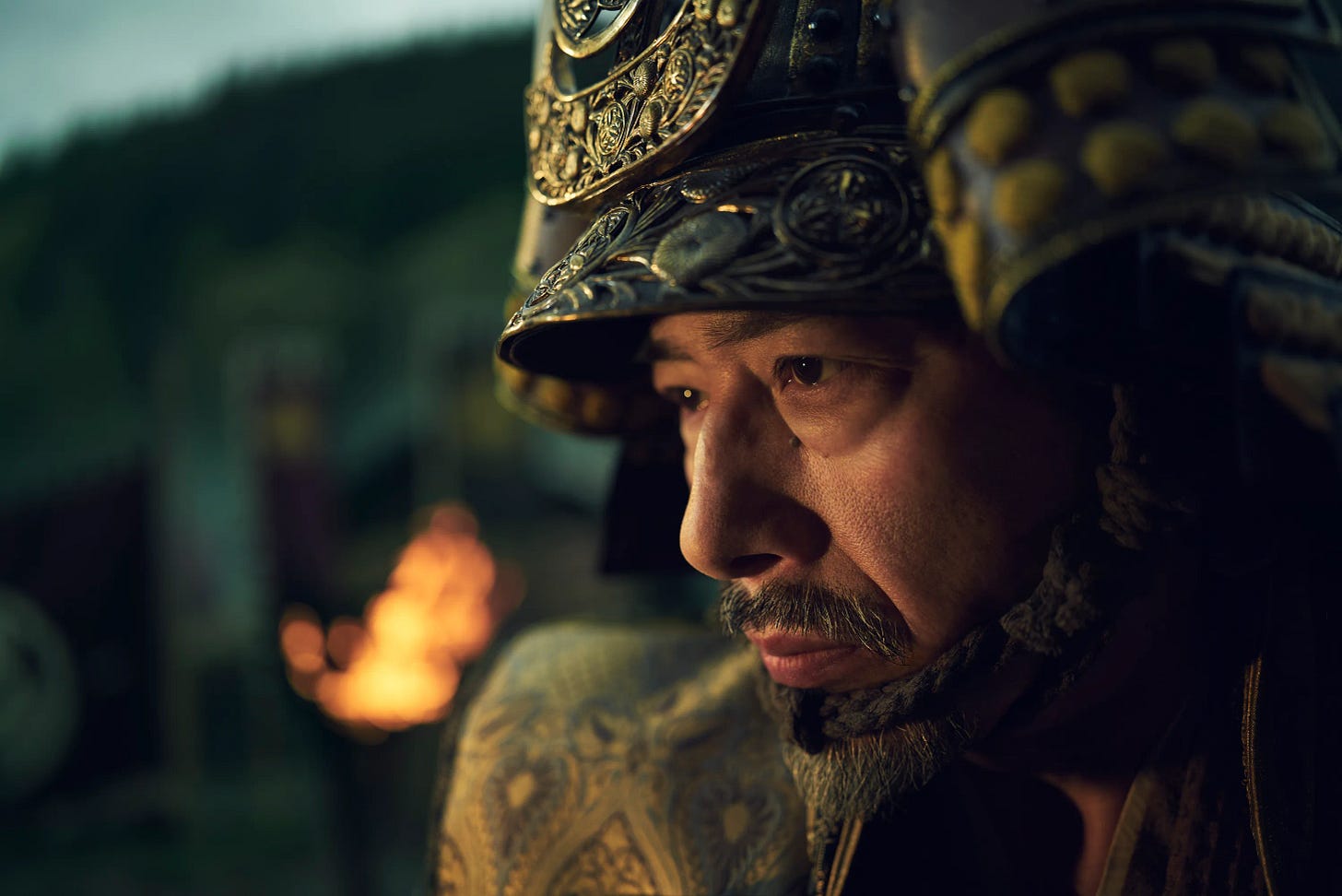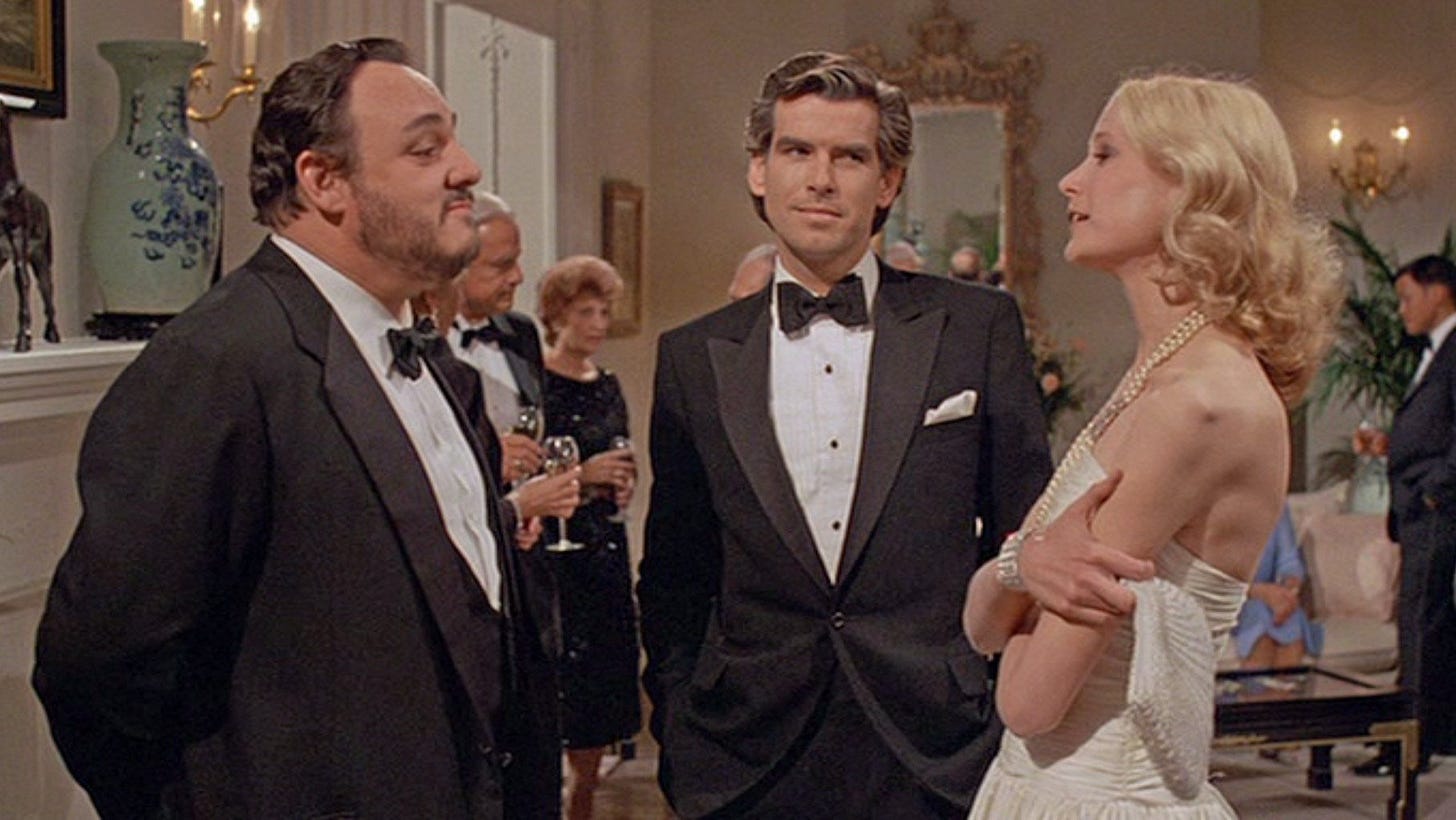Shogun or tai-pan? A weird Hong Kong legacy in 2024's "Shogun"
Even more than the bakufu, the "tai-pans" of James Clavell's lore were a curious mix of real life and feverish fantasy
By all indications, Shogun (2024) looks to be an amazing series for Hulu and FX. Crafted by Justin Marks and Rachel Kondo and led by fantastic actors like the charismatic Hiroyuki Sanada, the stunning Anna Sawai, and Cosmo Jarvis, the series is set in the year 1600 and charts the ferocious political and military struggles of Yoshii Toranaga (Sanada) as he schemes, manoeuvres, and amasses samurai against the Council of Regents. Made more complicated is the shipwrecked crew of a European ship, led by John Blackthorne (Jarvis). Blackthorne will go on to assist Toranaga to attain the most coveted title in all of Japan, a position of martial and political authority far surpassing that of the emperor: the show’s namesake, shogun.
If the name “Blackthorne” sounds familiar to older buffs of modern literature (and I’m getting old), it is because this series is based on Shogun (1975), a novel by James Clavell (1921-94). He was a historical fiction novelist that constructed an entire lore, even mythos, around what he termed, the story of “the Anglo-Saxon in Asia.” So much so that his series of novels, which chronologically begins with the original Shogun novel, is called the “Asian Saga.”
To be fair to Clavell, his original novel was relatively centred on Toranaga despite some fairly on-the-nose assessments about the “Japanese character” (and indeed, as we shall see, the Chinese character). Even better, Shogun 2024’s director Tim Van Patten has gone far beyond this series’ precursor, a miniseries adaptation from 1980. As Time has noted, this remake should be credited for showcasing how the three main characters, Toranaga, Blackthorne, and Mariko (Sawai) conspire and plot their own survival in a dangerous social context unique to each of them: stranded in a foreign, dangerous land, Blackthorne risks never returning home, Mariko wishes to commit suicide to regain her honor but also wants to live for God (she is a Catholic), and Toranaga’s clan could be destroyed if he doesn’t make the right moves and neutralise his foes at the right time.
Shogun maintains a commendable focus on what makes all stories good: “compelling characters, ingenious plots, universal themes,” as Time emphasizes. Yet the character of Toranaga still betrays a core preoccupation of the Australian-born author that inspired it all. An Ayn Rand devotee and a fierce advocate of capitalism and free trade, James Clavell was fascinated by the “great men of history,” singular personalities that were Napoleonic in their ambitions and achievements. Surveying their commercial and territorial fiefs and hurling thunderbolts, these Jupiterian men all desired power, power being the natural birthright and lifelong goal of all worthy males, and scheming and plotting were not just inevitable, but commendable deeds in the process of winning and keeping it.
To understand this beloved archetype of Clavell’s, one shouldn’t look to Toranaga or to the figure of the shogun, but rather to his true obsession: the tai-pans (大班) that grace his pages from Tai-Pan (1966) to Noble House (1981) and all the way to his last book, Whirlwind (1993). The tai-pans are, in Clavell’s world, European leaders of large companies with their base in Asia. Today, the use of the word “tai-pan” in Hong Kong simply denotes the heads of legacy blue chips or British-founded conglomerates, regardless of ethnicity: for example, the CEO of HSBC in Asia or the managing director of Jardines. It is, importantly, an informal, sometimes ironic reference that isn’t used even by the heads of those blue chips. These business leaders still prefer normal job titles.
The shogun as a military rank might have preceded the founding of Hong Kong, but the latter’s lustre in the Asian Saga is on another level, with Clavell revering them perhaps even more than how today’s corporate circles study Jeff Bezos, Elon Musk, or Mark Zuckerberg. The original big-dick tai-pan, Dirk Struan, effectively builds Hong Kong by compelling the assistance of the British government, with his descendant tai-pans governing Struan’s, nicknamed the “Noble House.” Throughout the books, the tai-pans will sometimes cross business and personal paths with Toranaga’s and Blackthorne’s descendants. Even more grandly, Dirk sees himself as being at the head of a moral destiny - a union of understanding between China and Britain.
The real opium dealer that founded the company Struan’s is based on, William Jardine (1784-1843), was nowhere near as glamorous nor as broad-minded. As a wealthy trader, he did successfully lobby Lord Palmerston to wage the First Opium War against Qing China. But he died a bachelor, wasn’t a cutlass-brandishing captain of clipper ships, and definitely was not given four halves of two coins that oath-bound him and his tai-pan descendants to a Mephistophelian Chinese merchant. For those that are interested, the “devil’s pact” that puts the Noble House on top of its competitors in 1841 is made between Dirk Struan and Jin-qua, who himself is based on Guangdong merchant head Howqua (1769-1843): another made-up connection by Clavell.
Creative license aside, even more made-up is the social position occupied by the tai-pans, from the 1840s all the way to post-World War Two Hong Kong. In Clavell’s imagination, the power of the tai-pans is exaggerated and romanticised to the point of delirium or delusion. It infects his entire understanding of everything Chinese. Humour me and check out this passage from the sequel book Noble House, which is set in 1960s Hong Kong (with the miniseries adaptation, starring Pierce Brosnan as Struan’s tai-pan Ian Dunross, being set in the 1980s before the city’s handover back to China):
“Very few Europeans knew that though tai-pan meant great leader, in the old days in China a tai-pan was the colloquial title of a man in charge of a whorehouse or public toilet. So no Chinese would ever call himself tai-pan, only loh-pan - which also meant great leader or head leader. Chinese and Eurasians were greatly amused that Europeans enjoyed calling themselves tai-pan, stupidly passing over the correct title.”
Once you encounter Clavell’s understanding of the term “loh-pan” (老闆), a realization will suddenly dawn on you, accompanied by a great deal of despair: that either, one: he didn’t know what the hell he was talking about, or, two: he knew but was bullshitting his primarily Caucasian readership and stretching the rules of historical fiction. He was not just exaggerating historical economic, political, and social roles, but outright making things up. After all, his European and Chinese characters throw around the word “joss” as a common phrase for good luck, whereas a two-hour layover at Hong Kong’s international airport will be enough for anyone to conclude that not a single person in the city talks about “joss.” It’s perhaps not surprising that Clavell presents loh-pan as some revered job title on the same level as that of his tai-pans, when it is as mundane and everyday a word as can be, used for shopkeepers and sole traders as much as CEOs.
His romanticising of the tai-pans was harmless, but has definitely not contributed to helping Westerners understand Chinese culture and society. Especially amidst today’s geopolitical climate, Clavell’s Orientalism, even if ultimately benign and not super patronising, still looks as outdated as the characters he admired so much in his tai-pans and his compradors, roles that were granted near-lordly and feudal power in his books but have long ceased to exist or influence anything or anyone. His heroes are refuted by modernity itself: the Los Angeles Times described the tai-pans as early as 1994, “useless appendages in an Asia for Asians.”
That was, to the year, three decades ago.
Perhaps it is fortuitous that a remake of Shogun finally arrives in 2024 after being in the writing and production wilderness for so long. The men that made war, murdered their own kin, and killed thousands to be shogun were real. The title and legacy of the shoguns were real, and Toranaga was far realer than Dirk Struan. It is ironic that the good writing in this year’s Shogun is at once a celebration of Clavell, yet also serves as an accidental refutation.





